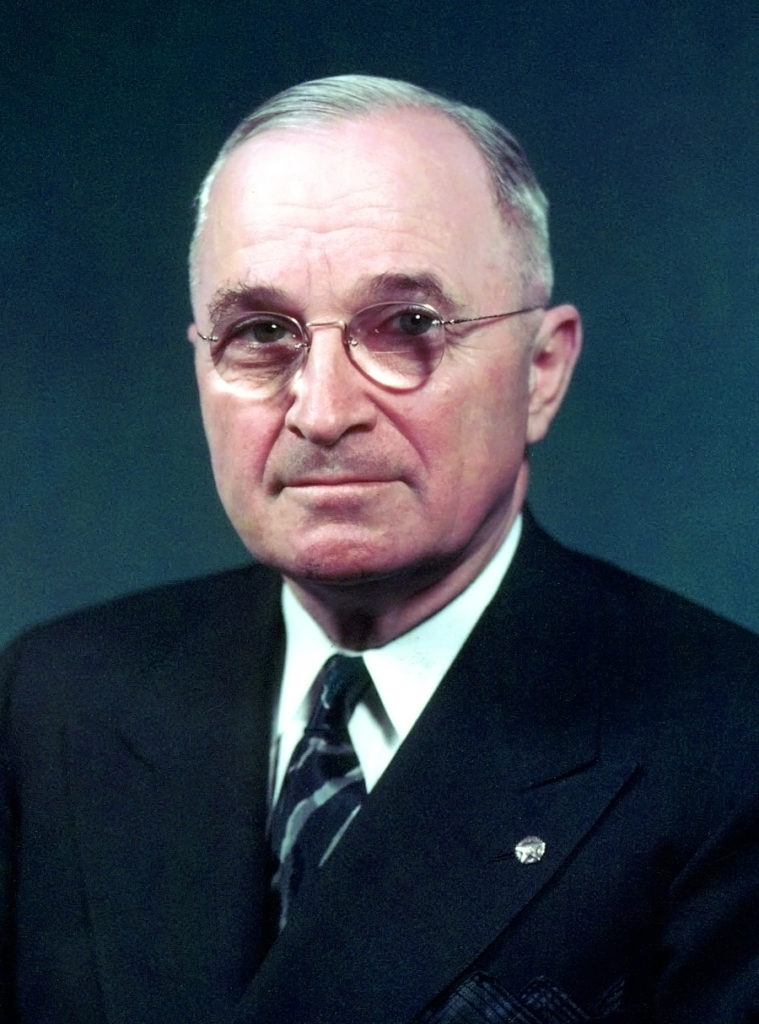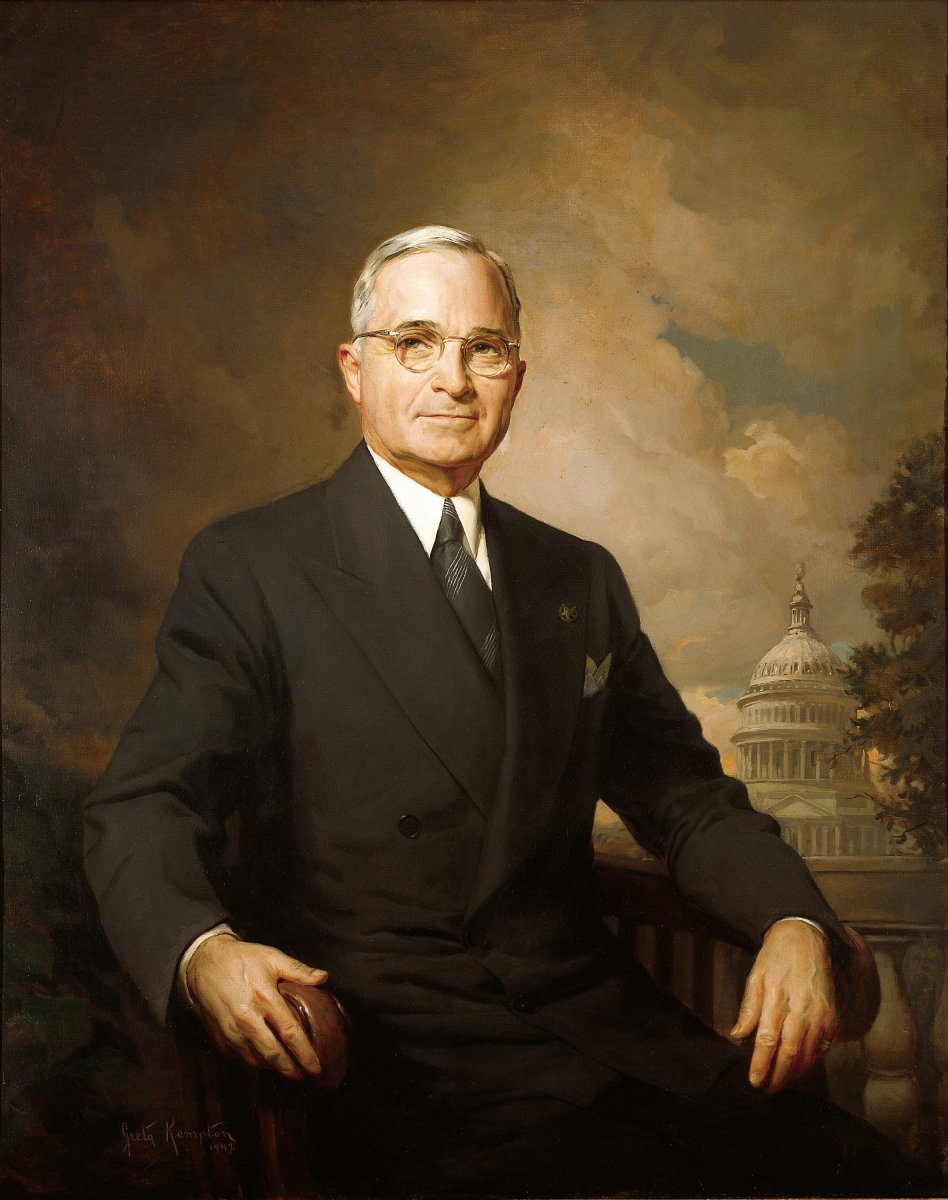
The Unlikely Titan: How Harry Truman Forged the American Century
By [Your Name/Journalist’s Name]
On April 12, 1945, the world stood at the precipice. World War II raged across two continents, the atomic age was dawning in secret, and a global ideological struggle was taking shape. That day, in a small office in the U.S. Capitol, Vice President Harry S. Truman, a man who had been Vice President for only 82 days, received a phone call summoning him to the White House. He arrived to find Eleanor Roosevelt, grim-faced, who put her arm around him and said, "Harry, the President is dead."

Truman, a former haberdasher and county judge from Missouri, suddenly found the weight of the free world on his shoulders. He later famously remarked, "I felt like the moon, the stars, and all the planets had fallen on me." It was a moment that encapsulated the essence of his presidency: an ordinary man thrust into extraordinary circumstances, facing decisions that would define the latter half of the 20th century. Underestimated, plain-spoken, and remarkably resilient, Harry S. Truman would prove to be one of America’s most consequential leaders, a figure whose quiet strength belied the seismic shifts he oversaw.
From Missouri Farm to Political Powerhouse
Truman’s journey to the pinnacle of power was anything but conventional for a future president. Born in Lamar, Missouri, in 1884, he grew up on a farm, excelling in school and developing a lifelong love for history. Poor eyesight prevented him from attending West Point, and a lack of funds kept him from college. He worked various jobs, including a bank clerk and a farmer, before serving with distinction as an artillery officer in World War I, leading Battery D in fierce combat in France.
Upon his return, he opened a haberdashery in Kansas City, which failed. His entry into politics came through the notorious Pendergast political machine in Jackson County, Missouri, a connection that would dog him throughout his career. Despite the association, Truman maintained a reputation for personal honesty and hard work as a county judge and later as a U.S. Senator. As a senator, he gained national recognition for chairing the "Truman Committee," which investigated waste and inefficiency in wartime defense contracts, saving taxpayers an estimated $15 billion. It was this reputation for integrity and diligence that caught Franklin D. Roosevelt’s eye, leading to his selection as Vice President in 1944.
The Burden of the Bomb and the Dawn of a New Era
Truman’s immediate challenge upon assuming the presidency was the ongoing war. Within weeks, he attended the Potsdam Conference with Winston Churchill and Joseph Stalin, grappling with the complexities of post-war Europe and the still-secret "Manhattan Project." The ultimate decision, however, would be his alone: whether to use the atomic bomb against Japan.
Faced with projections of massive American casualties from a conventional invasion of the Japanese mainland, and hoping to bring a swift end to the war, Truman authorized the use of the atomic bomb. On August 6, 1945, "Little Boy" devastated Hiroshima; three days later, "Fat Man" destroyed Nagasaki. Japan surrendered on August 15. The decision remains one of the most debated in history, but Truman consistently defended it as a necessary evil to save lives and conclude the war. "I regarded the bomb as a military weapon and never had any doubt that it should be used," he later wrote. The atomic age had begun, and with it, a new era of global power dynamics.
Forging the Cold War Framework

With the war over, Truman pivoted to the monumental task of shaping the post-war world. The fragile alliance with the Soviet Union quickly fractured, giving rise to the Cold War. Truman, advised by figures like George F. Kennan, embraced a strategy of "containment" – preventing the spread of Soviet influence without direct military confrontation.
This doctrine found its first major expression in the Truman Doctrine of 1947, a pledge of American support to "free peoples who are resisting attempted subjugation by armed minorities or by outside pressures." It was initially applied to aid Greece and Turkey, which were facing communist insurgencies. This was a radical departure from America’s traditional isolationism, signaling its new role as a global superpower.
Complementing this, the Marshall Plan (officially the European Recovery Program), also launched in 1947, provided over $13 billion in economic aid to rebuild war-torn Western Europe. Far from being mere charity, it was a shrewd strategic move, designed to bolster democratic governments, revive economies, and inoculate them against the appeal of communism. "Our policy is directed not against any country or doctrine but against hunger, poverty, desperation, and chaos," Truman stated. The plan was a resounding success, laying the foundation for decades of European prosperity and Western solidarity.
Truman’s resolve was further tested by the Berlin Blockade of 1948, when the Soviets cut off all land and water access to West Berlin. Rather than resort to military force, Truman authorized the Berlin Airlift, a monumental logistical effort that delivered supplies by air for nearly a year, ultimately forcing the Soviets to lift the blockade. This demonstrated America’s unwavering commitment to its allies and solidified its image as a dependable leader.
The capstone of his Cold War architecture was the formation of the North Atlantic Treaty Organization (NATO) in 1949, a military alliance designed for collective security against Soviet aggression. It was an unprecedented peacetime alliance, binding the United States and its Western European allies in a mutual defense pact that endures to this day.
The Fair Deal and the Battle for Civil Rights
Domestically, Truman faced immense challenges transitioning from a wartime to a peacetime economy. Inflation, labor strikes, and housing shortages plagued the nation. Despite these headwinds, he pursued his "Fair Deal" agenda, building upon FDR’s New Deal. He pushed for universal health insurance, federal aid to education, an increase in the minimum wage, and expanded social security. While many of his initiatives faced fierce opposition from a conservative Congress and didn’t fully pass during his presidency, they laid important groundwork for future social reforms.
Perhaps his most courageous domestic stand was on civil rights. In 1948, defying many within his own Democratic Party, Truman issued Executive Order 9981, desegregating the armed forces. He also pushed for federal anti-lynching laws and a permanent Fair Employment Practices Commission. His actions alienated the Dixiecrat wing of his party, but they marked a pivotal moment in the American Civil Rights Movement, establishing the federal government’s role in ensuring equality.
The Miracle of 1948 and the Korean Quagmire
The year 1948 was perhaps the most iconic of Truman’s presidency. Facing a fragmented Democratic Party, a surging Republican opponent in Thomas E. Dewey, and a hostile press, Truman was widely expected to lose. Polls, pundits, and even his own staff predicted his defeat. Yet, Truman, embracing his "give ’em hell, Harry" persona, embarked on an energetic "whistle-stop" campaign across the country, lambasting the "do-nothing" Republican Congress.
On election night, the Chicago Daily Tribune famously printed the premature headline: "DEWEY DEFEATS TRUMAN." The next morning, a beaming Truman held up the newspaper, proving everyone wrong. His come-from-behind victory remains one of the greatest upsets in American political history, a testament to his fighting spirit and direct appeal to the common man.
His second term, however, was dominated by the Korean War. In June 1950, North Korea invaded South Korea, prompting Truman to commit U.S. forces under a United Nations resolution. What he termed a "police action" quickly escalated into a brutal and costly conflict. His most controversial decision during the war was the firing of General Douglas MacArthur in April 1951. MacArthur, a revered war hero, had publicly challenged Truman’s limited war strategy, advocating for an expansion of the conflict into China. Truman, steadfast in his belief in civilian control of the military, fired the popular general, stating, "There’s only one boss here." The decision was deeply unpopular at the time, leading to a significant drop in his approval ratings, but it upheld a fundamental principle of American democracy.
The Legacy of "The Buck Stops Here"
By the end of his presidency in 1953, Harry Truman was one of the least popular presidents in modern history, burdened by the stalemated Korean War and accusations of corruption within his administration. He chose not to seek re-election and retired to his modest home in Independence, Missouri, where he spent his later years writing his memoirs and overseeing the creation of his presidential library.
In retirement, and especially after his death in 1972, Truman’s reputation steadily climbed. Historians began to appreciate the immense scope of the challenges he faced and the foundational decisions he made. His plain-spoken honesty, decisiveness, and unwavering commitment to his principles became hallmarks of his character. His most famous maxim, "The buck stops here," a sign on his White House desk, epitomized his acceptance of ultimate responsibility.
Harry S. Truman, the unassuming man from Missouri, was not a charismatic orator like Roosevelt or a towering figure like Churchill. He was, as he saw himself, a public servant who simply tried to do his best. Yet, in his eight years in office, he navigated the nation through the perilous end of World War II, ushered in the atomic age, defined the framework for the Cold War, launched landmark civil rights initiatives, and preserved the principle of civilian control over the military. He transformed America into the leader of the free world, setting the stage for the prosperity and global influence of the American Century. His improbable journey from obscurity to the Oval Office, and his steadfast leadership during a period of unprecedented global upheaval, cemented his place as an unlikely, but undeniably great, American titan.


